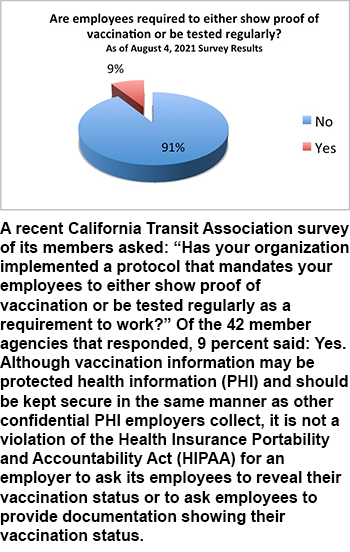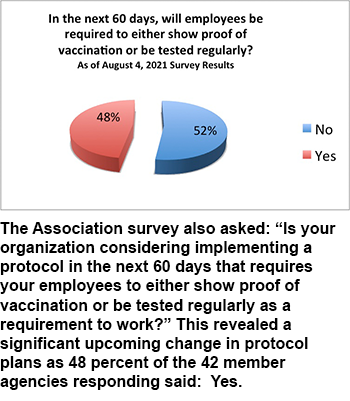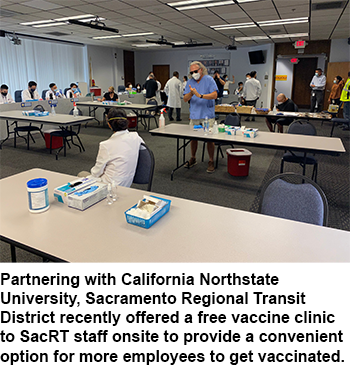As the COVID-19 Delta variant causes case numbers to spike, decisions whether or not to require vaccinations is becoming more pressing for employers and government officials.
By Stephanie Jordan
Managing Editor
Transit California
The U.S. Food and Drug Administration issued an emergency use authorization (EUA) on December 11 for the first vaccine for the prevention of coronavirus disease 2019 (COVID-19) caused by severe acute respiratory syndrome coronavirus 2 (SARS-CoV-2) in individuals 16 years of age and older. The EUA allowed the Pfizer-BioNTech COVID-19 vaccine to be distributed in the U.S. By December 18 a second EUA was issued to allow the Moderna COVID-19 vaccine to be distributed in the U.S. for use in individuals 18 years of age and older. By late February the first single-shot vaccine, developed by the Janssen Pharmaceutical Companies of Johnson & Johnson, to prevent COVID-19 in individuals 18 years of age and older received its EUA.
Regardless of the availability of three EUAs for COVID-19 vaccines, by June vaccination rates stalled, just as COVID-19 cases began to spike due to the new Delta variant. In mid-June, the U.S. Centers for Disease Control and Prevention (CDC) reported an average of about 12,000 new COVID-19 cases each day, but the rate recently surpassed 60,000 a day on average as new cases of COVID continue to surge across the U.S., driven by the fast-spreading and highly contagious Delta variant (which is more than twice as contagious as previous variants) that now accounts for the majority of COVID infections in the country.
In response to the uptick in cases, the federal government, some state and local governments, and many companies, including large employers, are requiring vaccinations. Rules vary, but many directives ask employees to show vaccination proof or submit to weekly COVID-19 testing, wear masks, and keep physically distant from other workers and visitors.
The effort to encourage the unvaccinated to get inoculated for protection in particular from the Delta variant appears to be working, as the pace of Covid-19 vaccinations in the U.S. has risen steadily since July, particularly in several Southern states with poor vaccination rates and strong hesitancy against the shot, according to a CNN analysis of data from the CDC. The news outlet recently reported that the seven-day average of new doses administered nationwide is 652,084 — up 26 percent from early-July.
STATE OF CALIFORNIA
Among the governments to take action, the State of California announced in late July the implementation of a protocol the requires all state workers and workers in health care and high-risk congregate settings to either show proof of full vaccination or be tested at least once per week, and encouraged all local government and other employers to adopt a similar protocol. The new policy for state workers went into effect August 2. The new policy for health care workers and congregate facilities took effect on August 9, and health care facilities had until August 23 to come into full compliance.
The University of California reversed course recently and said it will require all students, staff, and faculty to be vaccinated against the coronavirus this fall. In all, UC has more than 280,000 students and 227,000 faculty and staff, and expects to return to mostly in-person instruction at its 10 campuses starting in August.
NEW YORK CITY
New York City Mayor Bill de Blasio made an announcement on August 3 that the City will require proof of vaccination of people 12 and older to enter all restaurants, fitness centers, and indoor entertainment venues. Broadway theaters had already announced that they are requiring vaccinations for both audience and staff, at least through the month of October.
In his press event, the Mayor said “we’re calling it the Key to N.Y.C. Pass, the key to New York City. When you hear those words, I want you to imagine the notion that because someone’s vaccinated, they can do all the amazing things that are available in this city. This is a miraculous place, literally full of wonders. And if you’re vaccinated, all that’s going to open up to you. You’ll have the key. You can open the door. But if you’re unvaccinated, unfortunately, you will not be able to participate in many things. That’s the point we’re trying to get across. The Key to N.Y.C. Pass will be a first-in-the-nation approach. It will require vaccination for workers and customers in indoor dining, indoor fitness facilities, and indoor entertainment facilities. This is going to be a requirement. The only way to patronize these establishments indoors will be if you’re vaccinated — at least one dose. The same for folks in terms of work, they’ll need at least one dose.”
On August 16, 2021, the Mayor issued Executive Order No. 225 instituting the mandate and its requirements, as well as a set of frequently asked questions (FAQs). The mayor announced the new mandate to be effective on August 17 and that establishments will have until September 13 to get into compliance before being penalized for violations.
Also this month France's parliament passed a law that requires a "health pass" showing proof of vaccination or a negative PCR test in order to enter restaurants, bars and for travel on long-distance trains and planes.
ASSOCIATION SURVEY 
To assess the extent to which California's public transit and rail agencies are implementing similar vaccination requirements, the California Transit Association published a survey asking members to share responses by August 4. Of the 42 member agencies that participated in the survey, only 9 percent at that time requested proof of employee vaccination, but within 60 days time that number jumped to 48 percent. Most of the planned protocols include showing proof of vaccination or agree to be masked and to submit to mandatory weekly COVID testing.
The survey did reveal that agencies are not approaching the vaccination requirement lightly. Some agencies anticipate push back from their workforce ranging from concern to full out opposition, while others fear that disgruntled workers would rather opt to quit than submit to the mandate compounding already existing labor shortages. A few agencies said they are looking into the legalities of imposing a vaccine/testing mandate. Also noted by several agencies is the challenge of having to receive, review, and validate a “reasonable accommodation” to be exempt from the vaccination mandate.
One of the first agencies to initiate a vaccine mandate is the San Francisco Municipal Transportation Agency (SFMTA). San Francisco, a compact city of nearly 900,000 residents, has had some of the strictest pandemic-related restrictions in the country. The city was among the first in the nation to order a lockdown last year and its vaccination rates are some of the highest in the nation. At least 80 percent of residents are partially vaccinated and 70 percent of those 12 and older are fully vaccinated, according to Mayor London Breed.
On June 24, a new requirement was announced that all San Francisco city workers needed to be fully vaccinated and report that vaccination status to the City no later than 10 weeks after the FDA gives final approval to at least one COVID-19 vaccine. The policy, covering 35,000 municipal workers, includes language that states employees who refuse to get vaccinated and don’t get an exemption could be fired. The first part of the mandate, which began on June 28, was a 30-day window for employees to report to the city their current vaccination status, including showing proof of vaccination by uploading a photo of their vaccination card or the QR code generated by the state’s digital verification system. SFMTA, as part of the municipal workforce, is included in the mandate.
A recent Associated Press article quotes Leonard H. Sansanowicz, a Los Angeles employment attorney, as saying, “Under California law, employers can require their staff to get vaccinated as long as that requirement doesn’t interfere with the employees’ rights. You’ve got this inherent tension between an employee’s right to privacy, and right to freedom over their bodies, and the employers need for safety in the workplace.” He goes on to say that the Department of Fair Employment and Housing issued guidelines in March that set forth the rationale for employers to mandate staff to get vaccinated that included requiring employers to accommodate those city workers who won’t get a vaccine due to religious beliefs or medical reasons.
ONE BARRIER REMOVED
For some people, the EUA status of the Pfizer-BioNTech, Moderna, and Johnson & Johnson COVID vaccines calls into question the safety of the products and site that as the reason for refusing the COVID vaccine. This month, on August 23, the FDA officially approved the first COVID-19 vaccine. What has been known as the Pfizer-BioNTech COVID-19 vaccine will now be marketed as Comirnaty (koe-mir‘-na-tee), for the prevention of COVID-19 disease in individuals 16 years of age and older. The vaccine also continues to be available under emergency use authorization (EUA), including for individuals 12 through 15 years of age and for the administration of a third dose in certain immunocompromised individuals.
“The FDA’s approval of this vaccine is a milestone, as we continue to battle the COVID-19 pandemic. While this and other vaccines have met the FDA‘s rigorous, scientific standards for emergency use authorization, as the first FDA-approved COVID-19 vaccine, the public can be very confident that this vaccine meets the high standards for safety, effectiveness, and manufacturing quality the FDA requires of an approved product,” said Acting FDA Commissioner Janet Woodcock, M.D. at the time of the announcement. “While millions of people have already safely received COVID-19 vaccines, we recognize that for some, the FDA approval of a vaccine may now instill additional confidence to get vaccinated. Today’s milestone puts us one step closer to altering the course of this pandemic in the U.S.”
The day of the Pfizer announcement, SFMTA management sent a reminder that all SFMTA employees are required to be fully vaccinated within ten weeks after the FDA’s approval of one of the COVID-19 vaccines. That clock has now started and all SFMTA employees must be vaccinated or have received an exemption by November.
Other similar health and safety orders are happening around the State. On August 13 the City of Culver City announced its plan to establish a mandatory vaccination policy for 823 City employees, as well as City contractors, volunteers, and interns, including City of Culver CityBus. Prior to the order going into effect, the City will be meeting with employee labor groups to discuss the negotiable effects of the requirement.
REFUSALS & INCENTIVES 
As mandatory COVID-19 vaccines become more widespread, many employers are asking what they can do if workers refuse. The Equal Employment Opportunity Commission (EEOC) has weighed in with guidance that answers some workplace vaccination questions. For example, the agency said that federal anti-discrimination laws do not prohibit employers from requiring all employees who physically enter the workplace to be vaccinated for COVID-19. Employers that encourage or require vaccinations, however, must comply with the Americans with Disabilities Act (ADA), Title VII of the Civil Rights Act of 1964 and other workplace laws, according to the EEOC.
SHRM, the Society for Human Resource Management, reports that a vaccination mandate should be job-related and consistent with business necessity. Under the ADA, an employer can have a workplace policy that includes "a requirement that an individual shall not pose a direct threat to the health or safety of individuals in the workplace."
In the recent SHRM article, “Employers React to Workers Who Refuse Vaccination as COVID-19 Cases Rise” Brett Coburn, an attorney with Alston & Bird in Atlanta is quoted as saying: “In addition to legally protected reasons, employees may have general objections to receiving a COVID-19 vaccination that do not require a reasonable accommodation. Employers considering mandating vaccines should give very serious consideration to this issue. If a significant portion of the workforce refuses to comply, the employer may be put in the very difficult position of either adhering to the mandate and terminating all of these employees, or deviating from the mandate for certain employees, which can increase the risk of discrimination claims.”
When it comes to unionized workers, the mandate becomes more complex. In another SHRM article “Must Employers Bargain with Unions over Mandatory Vaccines?” the author writes: A unionized employer can't usually impose a mandatory vaccine policy unilaterally. Instead, an employer must bargain with the union to agreement or impasse before adopting such a policy, although a union may waive its right to bargain.” While some public transit union leaders have voiced support for mandatory vaccine policies, others have expressed concerns. In the article, Genaira Tyce, an attorney with Akerman in New York City is quoted as saying: "Given the controversial nature of mandatory vaccination, employers with a bargaining obligation that want to implement a mandatory vaccine policy should consider putting the bargaining representative on notice of its intent to implement the policy as soon as possible. Such notice creates sufficient time to bargain over the issue and ensures bargaining remains in line with the employer's operational needs and implementation timeline."
Some agencies, including County Connection, that hope to avoid the need to defend a mandate, are currently offering incentives to workers that voluntarily get vaccinated. Borrowing from the playbook of other organizations like Kroger’s and Safeway, workers are being offered a $100 incentive bonus, if they can show proof of a vaccination. Many companies in other industries are successfully using the cash bonus approach, for example food processing giant Tyson Foods is offering $200 bonuses and Wal-Mart is offering $150. Another common tactic is offering time off with pay to get vaccinated like Trader Joe’s (two hours of pay), Target (up to four hours of pay) and McDonald’s (four hours of pay). This approach of paying people to get vaccinated was also used in New York City, as over 11,000 New Yorkers claimed $100 incentives with their first vaccination in the course of just a few days in early August. Mayor de Blasio called using this tactic “a smart mix of incentives and mandates” that helped the city reach its milestone of 5 million New Yorkers receiving at least one dose of the vaccine. 
The concept of offering incentives before adopting a hardline mandatory vaccination policy is also being used in countries in Europe with various incentives, including cash payments and free football stadium tours, in the hopes of boosting the number of people willing to become vaccinated.
With these different incentive approaches being publicized, EEOC has issued updated guidance regarding providing incentives to employees to encourage COVID-19 vaccination, examining various scenarios under the Americans with Disabilities Act (ADA) and the Genetic Information Discrimination Act of 2008 (GINA). The updated guidance can be found here under items K.16 - K.21. The guidance confirms that under the ADA, as long as the incentive is not so substantial as to be coercive, an employer may provide an incentive (which may include both rewards and punishments) to employees for voluntarily receiving a vaccination administered by the employer or its agents. This tactic to increase access to vaccinations is being used by public transit agencies. Earlier this month, on August 6, the Sacramento Regional Transit District (SacRT) and California Northstate University teamed up for an onsite SacRT employee COVID-19 vaccine clinic. With the vaccines onsite, the clinic was also open to the public for two hours.
HEALTHY WORK ENVIRONMENT
With the Delta variant and other future variants predicted, the need for vaccinations to mitigate COVID-19 is expected to be ongoing for some time. To further contribute to a healthy work environment, public transit management may wish to take steps to encourage and incentivize employees to get vaccinated. Tactics currently being used successfully include:
- Developing vaccination education campaigns
- Making obtaining the vaccine as easy as possible for employees
- Covering any costs that might be associated with getting the vaccine
- Providing incentives to employees who get vaccinated
- Providing paid time off for employees to get the vaccine and recover from any potential side effects
Currently, the vast majority of people with severe cases of COVID-19 are unvaccinated. The push to verify that workers are fully vaccinated or test regularly is founded in ensuring the health and safety of everyone and to reduce the spread of COVID-19 in communities throughout California.